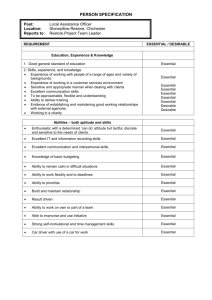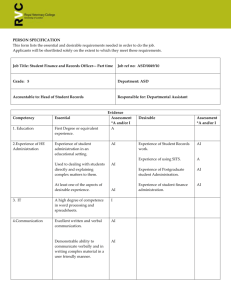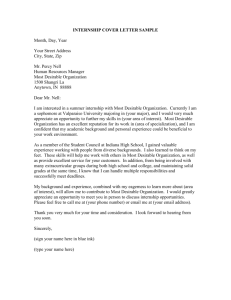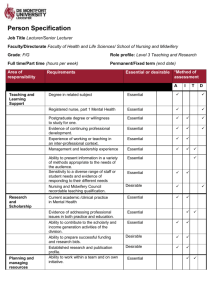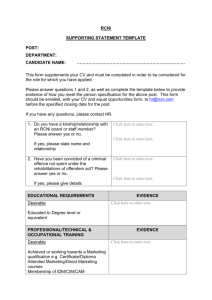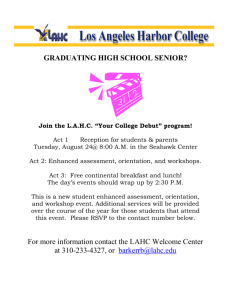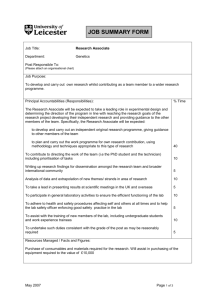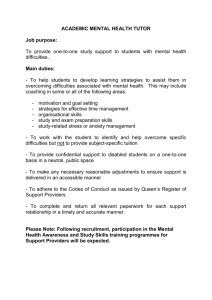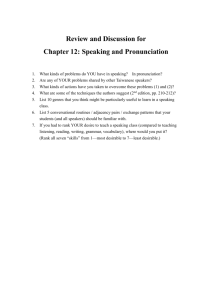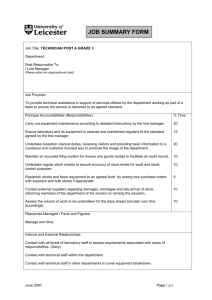Internship Toolkit
advertisement
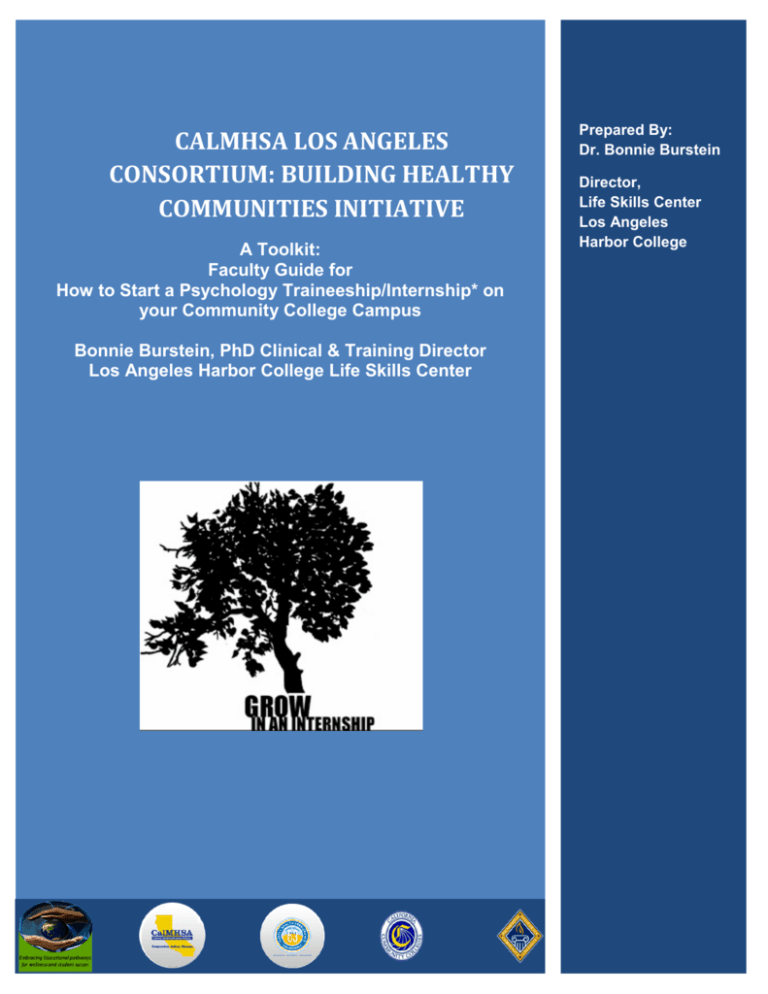
CALMHSA LOS ANGELES CONSORTIUM: BUILDING HEALTHY COMMUNITIES INITIATIVE A Toolkit: Faculty Guide for How to Start a Psychology Traineeship/Internship* on your Community College Campus Bonnie Burstein, PhD Clinical & Training Director Los Angeles Harbor College Life Skills Center Prepared By: Dr. Bonnie Burstein Director, Life Skills Center Los Angeles Harbor College 1 “Mental wellness is integral to learning. The less time and energy a student has to put toward feeling safe and well, the more time and energy they have to put into the reason they’re thereto get an education!” …Louise Douce, APA Mental health challenges represent a major barrier to student success. Sixty-four percent (64%) of students who drop out of college do so as a result of a mental health challenges (NAMI – National Alliance on Mental Illness – Survey, 2012.) Delivery of cost-effective mental health programs for college campuses is a key strategy for improving student achievement, closing achievement gaps, and increasing retention, persistence and completion rates. A Psychology Traineeship/Internship model for mental health services delivery is one cost effective, studentefficient way to address this need. The mission of college mental health services is to help students stay in school, finish, graduate or transfer to a 4-year school by offering easily accessed mental health services such as crisis intervention, brief treatment, community referrals, workshops on student success topics and psychoeducational support groups. Providing a Psychology Traineeship/Internship on campus is a cost-effective, student-efficient means for delivering such services. Getting a Psychology Traineeship/Internship Started on Your Campus Three Initial Considerations: • • • Funds Location Private space Funding. Psychology interns and practicum students/trainees are volunteers, but they do need a mental health professional to supervise the work they do, teach them by providing In-Service training and sign for their hours of service so that they may get credit for their efforts toward licensure. You may already have one or more licensed mental health professionals working at your college who might be interested in adding supervision of interns to their job description. Funding should be secured through the College or Health Center budgets to meet Title V obligations, federal parity regulations and federal financial mandates. Professional designation - costs to consider: There are many different professional designations under the rubric of mental health professional. In California we have Psychiatrists (MD), Clinical and Counseling Psychologists (PhD/PsyD), Educational Psychologists (EdD), Social Workers (LCSW/DSW), Marriage and Family Therapists (MFT), and Licensed Professional Counselors (LPC). Salary ranges vary from $300 per hour or more for a psychiatrist to $30-45 an hour for a recently minted LPC. Most designations require the supervisor to give trainees and interns one hour of supervision for every 10 hours of face-to-face client contact. The ratio is five-to-one for first year MFT Trainees. From their second year on, MFT Trainees can fulfill this requirement with a two-hour supervision group with up to eight interns. Bonnie Burstein, PhD – Training Director – LA College Consortium – bursteb@lahc.edu – (310) 233-4586 2 Other funds needed are minimal, but still necessary. Supplies, like boxes of tissues, file folders, computer printer cartridges, Xeroxing paper, toner, staples, paper clips, pens/pencils and duplicating services are some of other costs to keep in mind. A computer, printer, photocopy machine, FAX machine or access to one is useful when it becomes necessary to exchange information with off-campus professionals. Some basic office furniture, some comfortable chairs and/or a sofa, a desk or end table are all useful. A white noise generator for extra sound proofing and a paper shredder come in handy. A bibliotherapy lending library and training films are valuable additions, budget permitting. As the number of trainees/interns you have grows and the interest in your services increases, a secretary or office assistant is a very valuable asset. Some trainee/internships are funded with the college health fees, but this is not always possible. While local, state and federal grants are potentially useful in getting short-term funding, a more permanent solution is desirable. For this, you may need to “sell” the idea to your college administration. Please see Understanding College Student Mental Health Issues (Appendix 1, p. 9) for important up-to-date statistics on student mental health on college campuses. Be sure there is a basic consensus among college administration and faculty as to the need and utility for this service. One way to facilitate this is with a campus-wide needs assessment survey. For an example, see the one we developed for our Campus Based Grant (Appendix 2, p. 10). Location. In order to obtain interns, your school needs to be located close enough to a psychology graduate program to make it feasible for you to attract graduate students to your trainee/internship. A good rule of thumb is about 50 miles round-trip at most for the students. However, as there are more students needing placements than available slots in trainee/internships, even if your school is farther away it may still be worth it to a given student to make the longer commute. To assist you in locating the graduate schools nearest your college for prospective interns please see the list of all the Clinical Psychology and MFT Programs in California (Appendix 3, p.14). From Alliant to Vanguard, we list 105 different doctoral and masters programs statewide. Please contact me directly (see footer, below) if you’d like to learn some creative ways of enticing graduate students from far away even on a slim budget and alternative ways of delivering mental health services without a traineeship/internship using local community members and college staff. Private office space. In order for your trainees/interns to conduct counseling sessions with your students it is important to have a designated, dedicated private space for them to meet with the student(s), ideally near your Health Center, an important source of referrals. In addition to private space, you will need a locked filing cabinet to store the students’ confidential records. Once you have your basic program firmly established, you may consider a more decentralized model locating interns in different key areas of the campus. What’s in a name? While CalMHSA funding has already helped us make progress toward “stigma busting” and eliminating fears and misconceptions about mental illness, stigma still exists. The enterprise of counseling and the counseling relationship is still anathema to many cultural groups who attend out community colleges. It is for this reason that you might give Bonnie Burstein, PhD – Training Director – LA College Consortium – bursteb@lahc.edu – (310) 233-4586 3 consideration to what you call your service. “Student Psychological Services,” a typical name, may not sound appealing to a significant number of students who could benefit from them, if framed differently. “Wellness Center” has a more positive connotation to many. At LAHC we call ours the Life Skills Center and much of the service we deliver is educational in nature: Teaching students the skills to survive and thrive in college and life. Program offerings – A basic service delivery model: • • • • • Crisis intervention Brief treatment Community referrals Psychoeducational groups Workshops on student success topics Recruiting a mental health professional to coordinate and direct the traineeship/internship – Suggestions for what to look for: Ideally this person should be a mature and seasoned professional with at least 3 years postlicensure, who has previously supervised trainees/interns and/or run another traineeship/internship. Having prior experience with crisis intervention, brief treatment, and running psycho-educational groups as well as large scale public education campaigns are all valuable knowledge and skills. Be sure this person has had recent formal training in Behavior Intervention and Threat Assessment, as they will be a critical team member for your college BIT team. Ask to see their license and malpractice insurance to be sure they are current. Perform the usual background checks including checking with their licensing board to be sure there are no complaints lodged against them. As there are clinical as well as administrative/data collection aspects of the job, be sure this individual is strong in both. It’s a bonus if they have previously attended a community college themselves and are as close as possible an ethnic/cultural match for your student body. Recruiting, Selecting and Training Prospective Trainees and Interns: The licensure designation of your chosen mental health professional supervisor will determine the types of trainees/interns you can recruit. A licensed MFT professional can supervise MFTtrack Interns and first year Forensic Psychology Doctoral candidates. A Licensed Clinical Psychologist can supervise MFTs, LPC’s and all other Doctoral level Psychology graduate students. Non-MFT’s are required to take a 10 hour CE class to provide them with the theory and practices taught in MFT programs. Information about the classes can be accessed through the CAMFT (California Marriage and Family Therapist association: www.camft.org.) You will need to develop a brochure describing your Psychology Training Program (See our Life Skills Center Psychology Training Program brochure as an example, Appendix 4, p. 33). Bonnie Burstein, PhD – Training Director – LA College Consortium – bursteb@lahc.edu – (310) 233-4586 4 Start by familiarizing yourself with the graduate schools, their values and mission, to be sure that they are sufficiently aligned with yours. An initial face-to-face meeting with the Clinical Placement Coordinator can be useful. The work you do in the beginning to establish a good working relationship with the Clinical Placement Coordinators will benefit you. Once they know you and know who you are looking for in terms of the students you wish to recruit, they can save you time and they will be able to give you “good fits.” They are there to mediate constructively if anything (very rarely) goes wrong. Email, call, and ideally go visit the Clinical Coordinators at the graduate schools you have identified as being physically close enough to your institution to be viable sites from which to recruit your trainee/intern group. We’ve listed their names on the list of graduate programs, but be aware, these individuals change with a fair amount of frequency. Send copies of your brochure and a letter of introduction. Arrange a visit. They will also need to come visit your site and do their “due diligence” to determine if it is suitable for their students. They’ll want to see that you have the basics: at least one private consulting room, a locked filing cabinet for records, etc. Explain to the Clinical Placement Coordinator the kind of students you are looking for. For example, among other things, I am looking for bilingual/bicultural Latino students, as LAHC is an Hispanic Serving Institution (with 50% or more, Latino students attending). While most students who are admitted to college are proficient English speakers, when an individual talks about intensely personal, emotional things, they may wish to speak in their first language to an individual who can join them linguistically and culturally. Explain also how and when you want to hear from their students. At LAHC, we recruit most of our students for the following academic year’s class in the first 3 months of the calendar year. We request letters of interest and Vitas to be emailed in mid-January to mid-March. You also may wish to request letters of recommendation and transcripts. As time goes on, you may find that your current trainees/interns may have suggestions of prospective trainees/interns whom they know at their school and are your best PR advocates for future trainees/interns. You may also wish to develop an application form asking basic questions such as why a prospective trainee/intern is interested in your particular site, their theoretical orientation, future dreams and career arc, ways they see their strengths and weaknesses as a clinician, what they are looking for in terms of a supervisor and supervisory relationship. Reviewing these responses in a written form before meeting them for an interview gives you time during a subsequent interview for more of a conversational exchange to determine the “chemistry” between you and the goodness-of-fit between the student and your site. The Interview: There is really nothing like an in-person interview to ensure suitability and a good fit between the student and future supervisor. Such wide variability exists between what someone looks like on paper and feels like in person. Some traineeship/internship supervisors do phone interviews or Skype interviews. Those formats may be expeditious and efficient. However, if you’re going to spending about 3-5 hours per week or more for a year with a person, supervising their clinical Bonnie Burstein, PhD – Training Director – LA College Consortium – bursteb@lahc.edu – (310) 233-4586 5 work - a highly intimate and personal experience- you might want to investigate that experienceof being with them in person - ahead of time. Some graduate programs follow the guidelines of the Southern California Association of Psychology Training Programs (SCAPTP) and request that training programs adhere to their Uniform Notification Day (UND), the second Monday in April, and some do not. Find out where a school stands before making an offer of a position to a prospective trainee or intern from a particular school. See www.scaptp.org for details of their regulations and procedures. One aspect of the SCAPTP procedures on the UND is the potential that a student you liked and ranked as a first choice will not have ranked you as their first choice. When you call at the 9:00 am start time of the procedure they may not yet have heard from their first choice. The rules state that you will have to give them a half-hour for them to find out whether they’ve been accepted. Or, they may have already been accepted before you call, so be sure to have a longer list. Even if some of your choices turn you down, you will have enough good choices to fill all your positions with desired students. Criteria Used for Trainee/Intern Selection: Some supervisors value students who have high grades, glowing letters of recommendation from their professors, particular prior experiences in life or clinical training which they bring to your site. For our site, we have found it valuable to include students who themselves have been community college students. A picture’s worth a 1000 words. They can say, explicitly or implicitly to their student clients, “I once was where you are now. I made it here and so can you!” Diversity is key: Given the nature of our community colleges and our open door policies, the more demographically diverse the trainee/intern group you select, the greater the likelihood of providing “something for everyone.” As a college with extreme diversity, we work hard to get a proportional cultural and ethnic mix of trainees/interns as well as seek individuals with some prior life experience, who can better tolerate listening to the frequently painful realities of our students’ lives. Try to include both males, females, LGBTQ, young and older, differing SES, religion, linguistic and cultural capacities when and if possible. A mature person, someone for whom this is a second career can be a valuable choice. No longer at the end of adolescence, they already know who they are and are more able to devote all their energies to the training experience. Organizing your Intern/Trainee Class Prior to the Start Date: At least 6 – 8 weeks prior to their start date in mid-August, you may wish to request a short (50 word) biography from each student to share with your college community along with their schedules (which days they may be on campus) and specialties (different languages spoken, special knowledge of sub-populations). Compiling a list of confidential contact information is useful for trainee/internship staff to have as well as for the new intern class to have in order to Bonnie Burstein, PhD – Training Director – LA College Consortium – bursteb@lahc.edu – (310) 233-4586 6 reach each other and arrange for substitutes to cover crisis hours and other events, if they must be absent due to illness or other incapacity. We give incoming students choices on which days they will be present, which day they will receive individual supervision (related to the days they will be present), which workshops on student success topics they’d like to be responsible for offering during the year, what days they wish to offer them and which days they will present taped segments from their therapy work and case conferences presented during the first and second semesters. We also develop the calendar of In-Service Trainings and school holidays and share it at the Orientation, along with a description of the psychological problems of college students, a statement of goals of the traineeship/internship and a statement of policy in conducting our relationships. You can inform them that they need to get finger printed (livescan) and acquire their own malpractice insurance policy if their graduate school does not provide that, as well as acquire a voicemail service dedicated exclusively to their work at the college. The more paperwork/administrative details you can get out of the way through mail and email, the more time you can devote to interacting with the group and developing esprit de corps. Orientation for New Trainees and Interns: At the Life Skills Center at LAHC we bring our trainees/interns on board the week before the college’s scheduled Opening Day/Convocation for two full days of training These days are filled with basic information about the college, available student services, local referrals, how to fill out the forms we use, data collection procedures and other administrative matters. They need to sign a Volunteer Contract with the college, as well as one acknowledging what it means to be operating under their supervisor’s license and the responsibility that entails. The rest of the time is devoted to helping them get to know each other and you, role-play practice with critical training components such as: crisis intervention, suicide assessment, threat assessment, 5150 procedures and cooperating with our Sheriffs, child abuse and dependent/elderly abuse reporting, reviewing the mandated “Professional Psychotherapy Never Includes Sex” article, and their “elevator speech” about who they are and what the Life Skills Center is in preparation for meeting faculty and staff at the Opening Day/Convocation. We want the trainees/interns to feel comfortable and knowledgeable introducing themselves to faculty and staff and offering to come into their classrooms and student service sites to make a brief pitch about the LSC and/or give a talk/workshop on a basic topic like stress reduction or self-esteem. At mid-day, lunch is served. We usually invite key faculty and staff referral individuals to come for dessert and coffee to meet the new interns and trainees. Introducing your New Class of Trainees/Interns to the College-OpeningDay/Convocation: Opening Day/Convocation is the ideal time to introduce your new trainees and interns to the Campus Community. We prepare them the week before to learn how to talk about themselves as interns to faculty and explain Life Skills Center Services and other offerings. This can be a great introduction to the school and personnel. Bonnie Burstein, PhD – Training Director – LA College Consortium – bursteb@lahc.edu – (310) 233-4586 7 Trainee/Intern In-Service Training: Most professional degree designations require the clinical placement site to offer regular in-service training in addition to their individual and group supervision and the work experiences themselves. At the minimum, here are some basic ones with particular relevance for our community college populations: crisis intervention, brief treatment, suicidality, threat assessment, cultural sensitivity, reporting procedures for child and dependent elder abuse, college student services resources, how to create a positive relationship with clients and establish rapport, how to run a workshop on a college success topic. Inviting your trainee/intern group to come up with topics they would like to see and/or teach the group can be quite empowering. “We tend to support what we help to create!” Depending upon the theoretical orientation and philosophical bent of the mental health professional leading the traineeship/internship, trainings on theory and practice in the theory are also useful and valuable. Supervision: The trainees/interns are volunteers, but we “pay” them with our time. Doctoral students require an hour of individual and 2 hours of group supervision per week. Eight (8) is the ideal number of individuals in a group, research has shown). Use these rubrics to determine how many interns you can have. MFT students are not required to have individual supervision, but are required to have 2 hours of group supervision per week with a maximum of 8 group members. Trainee and intern graduate and professional schools require a 4-way agreement in which you describe your program and agree to follow various guidelines in your relationship to them and their students. One requirement is a fairly lengthy performance evaluation for each student, which, among other things includes a description of the procedures used for evaluation. A Competency-based evaluation system is available for MFT’s and is in development for PhD’s and PsyD’s. (See Pepperdine Professor Dr. Carol Falender’s website http://www.cfalender.com for some of the latest thinking on this.) Now Get Ready to Enjoy the Fruits of Your Labors! I have found running a Psychology Internship at a community college to be a deeply meaningful and pleasurable activity for many reasons! Having the trainees and interns means you can reach so many more students than you could as a single individual. We’ve had so many success stories of students feeling that they would have to drop out of school or thinking of taking their life, only to discover the emotional support and practical help that enable them to go on and succeed. It can be a great delight to work with the graduate students observing their learning and growth over the training year, helping to launch high quality professionals. * Practicum students/trainees and interns: The practicum is the first set of supervised practical training experiences in the sequence of professional training in psychology that extends from initial classroom education to internship and licensure. (See Hatcher, R.L. A Guide for Practicum Supervisors and Trainers at epsychologist.org for elaboration and distinctions.) Interns are more advanced students who have completed earlier training. The internship may be their last year of training pre- or postBonnie Burstein, PhD – Training Director – LA College Consortium – bursteb@lahc.edu – (310) 233-4586 8 doctorate. (For a full discussion of this see the http://www.CAPIC.net website in California and/or the national http://www.APPIC.org site.) Acknowledgements: You would not be reading this article had it not been for the visionary leadership of Dr. Deborah Tull and her passion and dedication to Community College students’ mental health. Much appreciation is offered to Jessie Flitter, MA who researched all the psychology degree granting institutions in California. Dr. Tull, Dr. Daniel Raker, Dr. Carl King and Jessie Flitter have my gratitude for their eagle eyes and due diligence with editing. Lastly, a deep and heartfelt thank you to the hundreds of psychology graduate students it has been my privilege to supervise and the thousands of students they have served in our colleges from whom I have learned so much about the vibrancy of the human spirit, even in the darkest times. Bonnie Burstein, PhD – Training Director – LA College Consortium – bursteb@lahc.edu – (310) 233-4586 9 Appendix 1 Meeting the Mental Health Challenge of College Students: An Invitation to Faculty to Team with the Life Skills Center Did you know that mental health challenges can interfere with student success and can be directly linked to retention and academic performance? The 2014* American College Health Association (National College Health Assessment) has identified many critical areas which most affect academic performance: • Stress (54%) • Sleep difficulties (60%) • Concern for friend or family (30%) • Depression/anxiety (55%) • Relationship difficulty (62%) • Death of friend or family (17%) • Alcohol and other substance use (7%) • With one exception, all of these concerns have doubled or quadrupled in their incidence in the last 5 years… Additional research tells us the following: Depression • • • ACHA Study: Nearly 33% of surveyed students reported feeling so depressed at times that they had trouble functioning. (American College Health Association, National College Health Assessment 2014) 46% of College Students felt things were hopeless at some time within the past year (ACHA-NCHA Data Fall 2014) Anxiety • Midwest University Study: Proportion of students seen for anxiety disorders doubled in comparison to previous studies. (Kansas State University Study (1989-2001) of 13,257 students cited in Benton, Robertson, Tseng, Newton, & Benton (2003, p.69) 55 % of students reported feeling overwhelming anxiety (ACHA-NCHA Data Fall 2014) • The 2nd leading cause of death for college students is suicide. (Jed Foundation, 2005) • Several national surveys reported that 4 in 5 college students drink and about half engage in heavy episodic drinking. (American Psychiatric Association, 2006) • Counseling Center Directors reported that nearly half of their clients have severe psychological problems (2010 National Survey of Counseling Center Directors) 71% of Directors said that the number of crisis issues has increased over the last five years (2010 National Survey of Counseling Center Directors) • Suicide Substance Abuse Severity & Increases Bonnie Burstein, PhD – Training Director – LA College Consortium – bursteb@lahc.edu – (310) 233-4586 10 Appendix 2 CONSORTIUM COLLEGE MENTAL HEALTH NEEDS SURVEY August 2012 Please mark an X by your primary campus: _____Los Angeles City College _____Los Angeles Harbor College _____Los Angeles Mission College _____Los Angeles Pierce College _____Los Angeles Southwest College _____Los Angeles Trade-Tech College Please mark an X by the degree of need on your campus: Degree of unmet mental health needs on your campus _____Tremendous _____Great _____Much _____Some _____None Do you have an operational Mental Health Service Unit on your Campus? _____Yes _____No Do you have an interest in having a Psychology Internship form of Mental Health Services Delivery on your campus? _____Yes _____No Do you have a streamlined referral process in place to handle mental health needs for your campus and community? _____Yes _____No Do you have a referral plan established with your local L.A. Country DMH Clinic? _____Yes _____No Do you have up-to-date mental health resources for your campus: Books, Films, Articles? _____Yes _____No Have you received training in how to identify and refer students who may be experiencing mental health problems? _____Yes _____No Do you have policies and procedures in place which reward help-seeking behavior on the part of students? _____Yes _____No Bonnie Burstein, PhD – Training Director – LA College Consortium – bursteb@lahc.edu – (310) 233-4586 11 Have you received training in violence prevention and how to develop safe and secure learning environments? _____Yes _____No Do you have a chapter of Active Minds or NAMI (these are student oriented public education and support group programs for students with mental health challenges) on campus? _____Yes _____No Do you have programs, referral sources and peer to peer support for Veterans on Campus? _____Yes _____No Do you have programs, referral sources and peer to peer support for Lesbians, Gays, Bisexuals, Transgender, or Questioning on campus? _____Yes _____No Have you had suicide prevention training before? _____Yes _____No Please indicate your informational and training needs by underlining which items most reflects your assessment of your needs. (See example, below): Most Desirable Very Desirable Desirable Less desirable Undesirable No Opinion Very Desirable Desirable Less desirable Undesirable No Opinion Very Desirable Desirable Less desirable Undesirable No Opinion Undesirable No Opinion Undesirable No Opinion Crisis Intervention Strategies Most Desirable Suicide Prevention Most Desirable Violence on campus/ threats to personal and campus safety Most Desirable Very Desirable Desirable Less desirable Discipline Problems Related to Mental Health Issues Most Desirable Very Desirable Desirable Less desirable Handling disruptive, distressing or bizarre behavior: crying, yelling, falling asleep, talking to self, speaking strangely Most Desirable Very Desirable Desirable Less desirable Undesirable No Opinion Domestic Violence, Sexual Violence, Stalking Most Desirable Very Desirable Desirable Less desirable Undesirable No Opinion Very Desirable Desirable Less desirable Undesirable No Opinion Bullying Most Desirable Bonnie Burstein, PhD – Training Director – LA College Consortium – bursteb@lahc.edu – (310) 233-4586 12 Stigma and Discrimination of psychological disabilities, physical disabilities, ethnicity/race and/or gender Most Desirable Very Desirable Desirable Less desirable Undesirable No Opinion Dealing with students/staff who are under the influence/intoxicated/ using drugs or alcohol in class or on campus Most Desirable Very Desirable Desirable Less desirable Undesirable No Opinion Very Desirable Desirable Less desirable Undesirable No Opinion Very Desirable Desirable Less desirable Undesirable No Opinion Very Desirable Desirable Less desirable Undesirable No Opinion Less desirable Undesirable No Opinion Anxiety/ Panic Disorders Most Desirable PTSD Most Desirable Schizophrenia Most Desirable Depression including Bipolar Disorder Most Desirable Very Desirable Desirable Personality Disorders (if specific in mind, please indicate _________________) Most Desirable Very Desirable Desirable Less desirable Undesirable No Opinion Very Desirable Desirable Less desirable Undesirable No Opinion Very Desirable Desirable Less desirable Undesirable No Opinion Eating Disorders Most Desirable Substance Abuse Most Desirable Attention Deficit Hyperactivity Disorder (ADD/ADHD) Most Desirable Very Desirable Desirable Less desirable Undesirable No Opinion Desirable Less desirable Undesirable No Opinion Less desirable Undesirable No Opinion Less desirable Undesirable No Opinion Therapeutic Use of Medication Most Desirable Very Desirable Information on Effective Therapies and Treatment Most Desirable Very Desirable Desirable Resources and Appropriate Referral Processes Most Desirable Very Desirable Desirable Lesbian, Gay, Bisexual, Transgender and Questioning (LGBTQ) Community Needs and Referrals Most Desirable Very Desirable Desirable Less desirable Undesirable No Opinion Desirable Less desirable Undesirable No Opinion Veterans Mental Health Issues Most Desirable Very Desirable Bonnie Burstein, PhD – Training Director – LA College Consortium – bursteb@lahc.edu – (310) 233-4586 13 Older adult students and their needs Most Desirable Very Desirable Desirable Less desirable Undesirable No Opinion Undesirable No Opinion How to respond or handle situations involving students’ families Most Desirable Very Desirable Desirable Less desirable Other (please indicate) ______________________ Most Desirable Very Desirable Desirable ___________________________ Less desirable Undesirable No Opinion Desirability of Training Formats (Please place an X next to the ones you prefer): ____Webinars _____Film Series _____Individual Campus Workshops _____State Technical Assistance Day-Long Consortium Training Event _____Full Access to Mental Health Website _____All of the Above Your campus’s need/desire for participation in the American College Health Association Survey (Since 2000 the survey has tracked changes in health issues and trends, enabling both ACHA and institutions of higher education to adequately identify factors affecting academic performance, respond to questions and concerns about the health of the nation’s students, develop a means to address these concerns, and ultimately improve the health and welfare of those students.) ____We would like to participate _____It is not necessary for our campus to participate We welcome your feedback, comments or questions: Please return your survey by Friday, September 28, 2012 to: Dr. Bonnie Burstein L.A. College Consortium Training Director Los Angeles Harbor College bursteb@lahc.edu (310) 233-4586 Bonnie Burstein, PhD – Training Director – LA College Consortium – bursteb@lahc.edu – (310) 233-4586 14 Appendix 3 Clinical Psychology and MFT Programs in California Southern California PsyD/PhD Programs 1. Alliant International University - Fresno 5130 E. Clinton Way Fresno, CA 93727 Phone: (559) 253-2200 Program Director: Robert Harris Email: rharris@alliant.edu 2. Alliant International University - Los Angeles 1000 South Fremont, Unit 5 Alhambra, CA 91803 Phone: (626) 270-3300 Clinical Director: Erin O’Callaghan Email: eocallaghan@alliant.edu 3. Alliant International University - San Diego 10455 Pomerado Road San Diego, CA 92131 Phone: (866) 825-5426 Clinical Training Director: Benjamin Caldwell Email: bcaldwell@alliant.edu 4. American School of Professional Psychology - Southern California 601 S Lewis St Orange, CA 92868 Phone: (714) 620-3700 Clinical Director: Tica Lopez, Psy.D. Email: tlopez@argosy.edu 5. Antioch University - Santa Barbara 602 Anacapa St. Santa Barbara, CA 93101 Phone: (805) 962-8179 Clinical Director: Sharleen O’Brien, Psy.D Email: sobrien@antioch.edu Bonnie Burstein, PhD – Training Director – LA College Consortium – bursteb@lahc.edu – (310) 233-4586 15 6. Azusa Pacific University 901 E. Alosta Ave., PO Box 7000 Azusa, CA 91702 Phone: (626) 969-3434 Clinical Director: Sheryn T. Scott, Ph.D. Email: sscott@apu.edu 7. Biola University 13800 Biola Ave. La Mirada, CA 90639 Phone: (562) -903-6000 Clinical Director: David M. Cimbora Phone: (562) 903-4867 8. California Lutheran University 60 West Olsen Road Thousand Oaks, CA 91360 Phone: (805) 493-3325 Clinical Training Director: Ryan Sharma, Psy.D. Email: rnsharma@callutheran.edu 9. California School of Forensic Studies, Alliant International University - Irvine 2855 Michelle Drive, Suite 300 Irvine, CA 92606 Phone: (949) 833-2651 Dean: Eric W. Hickey, Ph.D. Email: ehickey@alliant.edu 10. California School of Forensic Studies, Alliant International University - San Diego 10455 Pomerado Road San Diego, CA 92131 Phone: (866) 825-5426 11. Fuller Theological Seminary 135 N Oakland Ave Pasadena, CA, 91182 Phone: (626) 584-5200 Clinical Training Director: Stephen Simpson Email: stephensimpson@fuller.edu 12. Loma Linda University 11130 Anderson Street Loma Linda, CA, 92350 Phone: (909) 558-1000 Bonnie Burstein, PhD – Training Director – LA College Consortium – bursteb@lahc.edu – (310) 233-4586 16 13. Pacifica Graduate Institute 249 Lambert Road Carpinteria, CA 93013 Phone: (805) 969-3626 ext.103 14. Pepperdine University 24255 Pacific Coast Highway Malibu, CA 90263 Phone: (310) 506-4000 15. Phillips Graduate Institute 19900 Plummer St. Chatsworth, CA 91311 Phone: (818) 861-6627 16. San Diego State University/University of California -San Diego 5500 Campanile Drive San Diego, CA 92182 Phone: (619) 594-5200 17. The Chicago School of Professional Psychology - Irvine 4199 Campus Dr Irvine, CA 92612 Phone: (949) 737-5460 Department Chair: Dr. Sean Sterling Email: ssterling@thechicagoschool.edu 18. The Chicago School of Professional Psychology - Los Angeles 617 West 7th Street Los Angeles, CA 90017 Phone: (213) 615-7200 Clinical Training Director: Laura Negin Email: lnegin@thechicagoschool.edu 19. The Chicago School of Professional Psychology - Westwood 1145 Gayley Avenue #322 Los Angeles, CA 90024 Phone: (310) 208-4240 20. University of California - Berkeley 200 California Hall # 1500 Berkeley, CA 94720 Phone: (510) 642-6000 21. University of California - Los Angeles 405 Hilgard Ave Los Angeles, CA 90095 Phone: (310) 825-9989 Bonnie Burstein, PhD – Training Director – LA College Consortium – bursteb@lahc.edu – (310) 233-4586 17 22. University of La Verne 1950 Third Street La Verne, CA 91750 Phone: (909) 593-3511 23. University of Southern California 3601 South Flower Room 112 Los Angeles, CA 90089 Phone: (213) 740-2311 Northern California PsyD/PhD Programs 24. Alliant International University - Sacramento 2030 W El Camino Ave Sacramento, CA 95833 Phone: (916) 565-2955 Program Director: Beth Limberg Email: blimberg@alliant.edu 25. Alliant International University - San Francisco Bay 1 Beach St Ste 100 San Francisco, CA94133 Phone: (415) 391-8399 Director of Training: Randall Wyatt Email: rwyatt@alliant.edu 26. American School of Professional Psychology at Argosy University - San Francisco Bay Area 1005 Atlantic Avenue Alameda, CA 94501 Phone: (510) 217-4700 27. California Institute of Integral Studies 1453 Mission Street San Francisco, CA 94103 Phone: (415) 575-6100 Program Chair: Tanya Wilkinson Email: twilkinson@ciis.edu 28. California School of Forensic Studies, Alliant International University - Fresno Campus 5130 E. Clinton Way Fresno, CA 93727 Phone: (559) 253-2200 Program Director: Robert Harris Email: rharris@alliant.edu Bonnie Burstein, PhD – Training Director – LA College Consortium – bursteb@lahc.edu – (310) 233-4586 18 29. California School of Forensic Studies, Alliant International University - San Francisco Campus One Beach Street, Suite 100 San Francisco, CA 94133 Tel: (415) 955-2100 Clinical Training Director: Randall Wyatt Email: rwyatt@alliant.edu 30. ITP/Sofia University 1069 E Meadow Cir Palo Alto, CA 94303 Phone: (650) 493-4430 Director of Clinical Training: Ron Pilato, Psy.D. Email: Ron.Pilato@sofia.edu 31. John F. Kennedy University 100 Ellinwood Way Pleasant Hill, CA 94523 Phone: (925) 969-3300 32. Meridian University 47 Sixth Street Petaluma, CA 94952 Phone: (707) 765-1836 33. Palo Alto University, Pacific Graduate School of Psychology 1791 Arastradero Road Palo Alto, CA 94304 Phone: (800) 818-6136 Clinical Training Director: Grace A. Chen, Ph.D. Email: gchen@paloaltou.edu 34. Palo Alto University, PGSP-Stanford Consortium 1791 Arastradero Road Palo Alto, CA 94304 Phone: (800) 818-6136 Clinical Training Director: Kimberly Hill, Ph.D. Phone: 650-725-5582 35. Saybrook University 747 Front St. 3rd Floor San Francisco, CA 94111 Phone: (415) 433-9200 Bonnie Burstein, PhD – Training Director – LA College Consortium – bursteb@lahc.edu – (310) 233-4586 19 36. The Wright Institute 2728 Durant Ave. Berkeley, CA 94704 Phone: (510) 841-9230 Clinical Training Director: Gilbert Newman Email: gnewman@wi.edu 37. University of San Francisco 2130 Fulton Street San Francisco, CA 94117 Phone: (415) 422-2806 Dean for Community Partnerships: Wanda Borges Email: wborges@usfca.edu Northern California MFT Programs 38. Alliant International University - Sacramento 2030 W El Camino Ave Sacramento, CA 95833 Phone: (916) 565-2955 39. Alliant International University - San Francisco 1 Beach St Ste 100 San Francisco, CA 94133 Phone: (415) 391-8399 40. Argosy University - San Francisco Campus 1005 Atlantic Avenue Alameda, CA 94501 Phone: (510) 217-4700 41. California Institute of Integral Studies 1453 Mission Street San Francisco, CA 94103 Phone: (415) 575.6100 Program Chair: Steven Tierney, Ed.D., CAS Email: stierney@ciis.edu 42. California State Polytechnic University - San Luis Obispo 1 Grand Avenue Building 47-24 San Luis Obispo, CA 93407 Phone: (805) 756-2033 Bonnie Burstein, PhD – Training Director – LA College Consortium – bursteb@lahc.edu – (310) 233-4586 20 43. California State University - Bakersfield 9001 Stockdale Highway Bakersfield, CA 93311 Phone: (661) 654-2363 Program Coordinator: Dr. Ken Ishida Email: kishida@csub.edu 44. California State University - Chico 400 West First Street Chico, CA 95929 Phone: (530) 898-4636 Program Coordinator: Peter A. Lopez, Ph.D. Email: palopez@csuchico.edu 45. California State University – Fresno 5241 N. Maple Ave., Fresno, CA 93740 Phone: (559) 278-0283 Program Chair: Albert Valencia Email: albertv@csufresno.edu 46. California State University - East Bay 25800 Carlos Bee Blvd, Hayward, CA 94542 Phone: (510) 885-3011 47. California State University - Sacramento 6000 J Street Sacramento, CA 95819 Phone: (916) 278-5942 48. California State University – Stanislaus One University Circle Turlock, CA 95382 Phone: (209) 667-7067 Graduate Secretary: Galdina Serrano Phone: (209) 667-3386 49. Dominican University of California 50 Acacia Avenue San Rafael, CA 94901 Phone: (415) 457-4440 Department Chair: Robin Gayle Email: robin.gayle@dominican.edu Bonnie Burstein, PhD – Training Director – LA College Consortium – bursteb@lahc.edu – (310) 233-4586 21 50. Golden Gate University 536 Mission Street San Francisco, CA 94105 Phone: (415) 442-7000 51. Holy Names University 3500 Mountain Boulevard Oakland, CA 94619 Phone: (510) 436-1000 Director of Counseling Programs: Helen Shoemaker, Ph.D. Email: shoemaker@hnu.edu 52. Humboldt State University 1 Harpst Street Arcata, CA 95521 Phone: (707) 826-3755 Department Chair: Gregg Gold Email: gregg@humboldt.edu 53. John F. Kennedy University 100 Ellinwood Way Pleasant Hill, CA 94523 Phone: (925) 969-3300 54. John F. Kennedy University 2956 San Pablo Avenue Berkeley, CA 94702 Phone: (800) 696-5358 55. John F. Kennedy University 3031 Tisch Way 3 Plaza West San Jose, CA 95128 Phone: (408) 236-1120 56. Notre Dame de Namur University 1500 Ralston Avenue Belmont, CA 94002 Phone: (650) 508-3557 Department Chair: Helen Marlo, Ph.D. Email: hmarlo@ndnu.edu 57. Palo Alto University 1791 Arastradero Road Palo Alto, CA 94304 Phone: (800) 818-6136 Clinical Training Director: Timothy Baima, Ph.D. Email: tbaima@paloaltou.edu Bonnie Burstein, PhD – Training Director – LA College Consortium – bursteb@lahc.edu – (310) 233-4586 22 58. San Francisco State University 1600 Holloway Avenue San Francisco, CA 94132 Phone: (415) 338-2005 Counseling Coordinator: Kwan, Kwong–Liem Karl email: kwan@sfu.edu 59. San Jose State University 1 Washington Sq. San Jose, CA 95112 Phone: (408) 924-1000 Director of Clinical Training: Glenn M. Callaghan, Ph.D. Email: Glenn.Callaghan@sjsu.edu 60. Santa Clara University 500 El Camino Real Santa Clara, CA 95053 Phone: (408) 554-4000 Practicum Coordinator: Jean Riney-Niewiadomski, LCSW Email: jrineyniewiadomski@scu.edu 61. Saybrook University 747 Front St. 3rd Floor San Francisco, CA 94111 Phone: (415) 433-9200 62. Simpson University 2211 College View Dr. Redding, CA 96003 Phone: (530) 224-5600 63. Sofia University 1069 E Meadow Cir Palo Alto, CA 94303 Phone: (650) 493-4430 64. Sonoma State University 1801 E Cotati Ave Rohnert Park, CA 94928 Phone: (707) 664-2880 65. St. Mary's College of California 1928 St Marys Rd Moraga, CA 94556 Phone: (925) 631-4000 Bonnie Burstein, PhD – Training Director – LA College Consortium – bursteb@lahc.edu – (310) 233-4586 23 66. University of Phoenix - Bay Area 3590 N 1st St. San Jose, CA 95134 Phone: (800) 266-2107 67. University of Phoenix - Central Valley 45 E River Park Pl E. Fresno, CA 93720 Phone: (800) 266-2107 68. University of Phoenix - Sacramento 2860 Gateway Oaks Dr. Sacramento, CA 95833 Phone: (800) 266-2107 69. University of San Francisco 2130 Fulton St. San Francisco, CA Phone: (415) 422-5555 Program Coordinator: Carmen Pacheco-Cueba Email: cpacheco@usfca.edu 70. The Wright Institute 2728 Durant Ave. Berkeley, CA 94704 Phone: (510) 841-9230 Clinical Training Director: Gilbert Newman Email: gnewman@wi.edu Southern California MFT Programs 71. Antioch University - Los Angeles 400 Corporate Pointe Culver City, CA 90230 Phone: (310) 578-1080 Director of Clinical Training: Sara Lederer, Psy.D. Phone: (310) 578-1080 ext. 307 72. Azusa Pacific University - Azusa 901 E Alosta Ave Azusa, CA 91702 Phone: (626) 969-3434 Director of Clinical Training: Bobbi Thomas, LMFT Email: rthomas@apu.edu Bonnie Burstein, PhD – Training Director – LA College Consortium – bursteb@lahc.edu – (310) 233-4586 24 73. California State University, Dominguez Hills 1000 East Victoria Street Carson, CA 90747 Phone: (310) 243-3696 Program coordinator: Michael Laurent, Ph.D. Email: mlaurent@csudh.edu 74. California State University - Long Beach 1250 Bellflower Blvd Long Beach, CA 90840 Phone: (562) 985-4111 Clinical Training Lead: William Saltzman, LMFT Email: william.saltzman@csulb.edu 75. California State University - Northridge 18111 Nordhoff Street Northridge, CA 91330 Phone: (818) 677-1200 Clinical Training Lead: Stan Charnofsky, Ed.D. Email: stan.charnofsky@csun.edu 76. California State University - Northridge 18111 Nordhoff Street Northridge, CA 91330 Phone: (818) 677-1200 Clinical Training Lead: Stan Charnofsky, Ed.D. Email: stan.charnofsky@csun.edu 77. California State Polytechnic - Pomona 3801 W Temple Ave Pomona, CA 91768 Phone: (909) 869-7659 Clinical Training Lead: Jeff Mio, Ph.D. Email: jsmio@csupomona.edu 78. Fuller Graduate School of Psychology - Pasadena 135 North Oakland Avenue Pasadena, CA 91101 Phone: (626) 584-5200 79. Loyola Marymount University - Los Angeles 1 LMU Dr. Los Angeles, CA 90045 Phone: (310) 338-2700 Practicum Coordinator: Kathleen Fogel-Richmond, LMFT, ATR Phone: (310) 338-4562 Bonnie Burstein, PhD – Training Director – LA College Consortium – bursteb@lahc.edu – (310) 233-4586 25 80. Mount St. Mary’s College - Los Angeles 12001 Chalon Rd. Los Angeles, CA 90049 Phone: (310) 954-4250 Clinical Training Director: Darla Dunlop, Ph.D. Email: ddunlop @ msmc.la.edu 81. Pacific Oaks College - Pasadena 55 W Eureka St. Pasadena, CA 91103 Phone: (626) 529-8061 Clinical Training Director: Donald Grant, Psy.D. 82. Pepperdine University - Los Angeles Campus 24255 Pacific Coast Hwy Malibu, CA 90263 Phone:(310) 506-4000 Clinical Training Director: Adriana Estrada Email: adriana.estrada@pepperdine.edu 83. Phillips Graduate Institute 19900 Plummer St Chatsworth, CA 91311 Phone: (818) 386-5600 Clinical Training Director: Shelly Stee, LMFT Email: sstee@pgi.edu 84. Ryokan College - Los Angeles 11965 Venice Blvd Los Angeles, CA 90066 Phone: (310) 390-7560 85. The Chicago School of Professional Psychology - Los Angeles 617 West 7th Street Los Angeles, CA 90017 Phone: (213) 615-7200 Training Coordinator: Jay Burke, MS Email: jburke@thechicagoschool.edu 86. University of La Verne 1950 3rd St. La Verne, CA 91750 Phone: (909) 593-3511 Clinical Training Contact: Dorie Richards, LMFT Email: drichards@laverne.edu Bonnie Burstein, PhD – Training Director – LA College Consortium – bursteb@lahc.edu – (310) 233-4586 26 87. University of Phoenix, Los Angeles Campus 5955 De Soto Ave Woodland Hills, CA 91367 Phone: (800) 888-1968 Clinical Training Contacts: Victoria Cameron, LMFT, Diana Herwick, Psy.D. 88. University of Southern California, Los Angeles 3601 South Flower Room 112 Los Angeles, CA 90089 Phone: (213) 740-2311 Placement Coordinator: Derek Sapico, LMFT Email: dsapico@usc.edu 89. Brandman University, Victorville Campus 16355 Laguna Canyon Road Irvine, CA 92618 Phone: (800) 746-0082 Clinical Training Coordinator: Christopher Deulen, Ph.D. Email: deulen@brandman.edu 90. Brandman University, Ontario Campus 3990 Concours St #100 Ontario, CA 91764 Phone: (909) 481-1804 Clinical Training Coordinator: Christopher Deulen, Ph.D. Email: deulen@brandman.edu 91. California Baptist University 8432 Magnolia Ave. Riverside, CA 92504 Phone: (877) 228-3615 Clinical Training Contact: Angela Deulen, LMFT 92. California State University, - San Bernardino 5500 University Pkwy San Bernardino, CA 92407 Phone: (909) 537-5000 Clinical Training Coordinator: David Chavez, Ph.D. Email: dchavez@csusb.edu 93. National University - San Bernardino Campus 804 E Brier Dr. San Bernardino, CA 92408 Phone: (909) 806-3300 Clinical Training Coordinator: Monica Wilson, Ph.D. Bonnie Burstein, PhD – Training Director – LA College Consortium – bursteb@lahc.edu – (310) 233-4586 27 Email: mwilson2@nu.edu 94. Loma Linda University 24851 Circle Dr. Loma Linda, CA 92354 Phone: (909) 558-4000 Clinical Training Contacts: Winetta Baker, Ph.D., Mary Moline, Ph.D 95. University of Phoenix - Southern California Campus 3090 Bristol Street Costa Mesa, CA 92626 Phone: (866) 766-0766 Clinical Contact: Diana Herweck, Psy.D. 96. Argosy University - Orange 601 S Lewis St. Orange, CA 92868 Phone: (714) 620-3700 Clinical Contact: Susan Kaneshiro, Psy.D. 97. Azusa Pacific University - Orange 1915 W Orangewood Ave #100 Orange, CA 92868 Phone: (714) 935-0260 Director of Clinical Training: Bobbi Thomas, LMFT Email: rthomas@apu.edu 98. CA Southern University - Irvine 930 Roosevelt Irvine, CA 92620 Phone: (800) 477-2254 Clinical Training Contact: Kathleen Hawks, LMFT 99. CA State University - Fullerton 800 N State College Blvd Fullerton, CA 92831 Phone: (657) 278-2011 Clinical Training Director: Mary Read, Ph.D. Email: mread@fullerton.edu 100. Chapman University - Orange 1 University Drive Orange, CA 02866 Phone: (715) 997-6815 Program Manager: Sheryl Ralph, M.A., LMFT Bonnie Burstein, PhD – Training Director – LA College Consortium – bursteb@lahc.edu – (310) 233-4586 28 101. Hope International University - Fullerton 2500 Nutwood Ave Fullerton, CA 92831 Phone: (866) 722-4673 Program Director: Susan Hastings, Psy.D. Email: slhastings@hiu.edu 102. Pepperdine University - Irvine 18111 Von Karman Ave Irvine, CA 92612 Phone: (949) 223-2500 Clinical Training Contact: Adriana Estrada Email: adriana.estrada@pepperdine.edu 103. The Chicago School of Psychology - Irvine 4199 Campus Drive Irvine, CA 92612 Phone: (949) 769-7700 Clinical Training Director: Melody Bacon, Ph.D. Email: MBacon@thechicagoschool.edu 104. University of Phoenix - Orange County 3150 Bristol St Costa Mesa, CA 92626 Phone: (213) 797-4758 Clinical Training Contact: Michelle Crawford, LMFT 105. Vanguard University - Costa Mesa 55 Fair Dr. Costa Mesa, CA 92626 Phone: (714) 556-3610 Director of Clinical Training: Jeannie Colvin Phone: (714) 619-6452 Bonnie Burstein, PhD – Training Director – LA College Consortium – bursteb@lahc.edu – (310) 233-4586 29 Appendix 4 Bonnie Burstein, PhD – Training Director – LA College Consortium – bursteb@lahc.edu – (310) 233-4586 30 Bonnie Burstein, PhD – Training Director – LA College Consortium – bursteb@lahc.edu – (310) 233-4586 31 Bonnie Burstein, PhD – Training Director – LA College Consortium – bursteb@lahc.edu – (310) 233-4586 32 Bonnie Burstein, PhD – Training Director – LA College Consortium – bursteb@lahc.edu – (310) 233-4586 33 Bonnie Burstein, PhD – Training Director – LA College Consortium – bursteb@lahc.edu – (310) 233-4586
